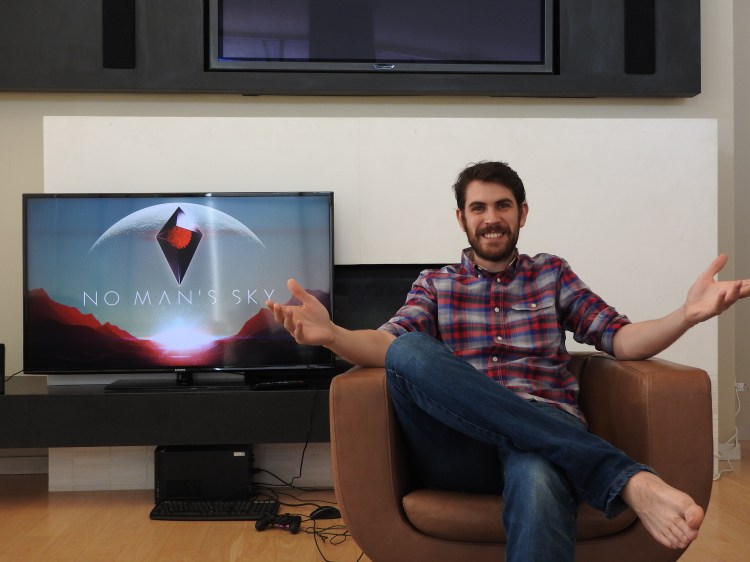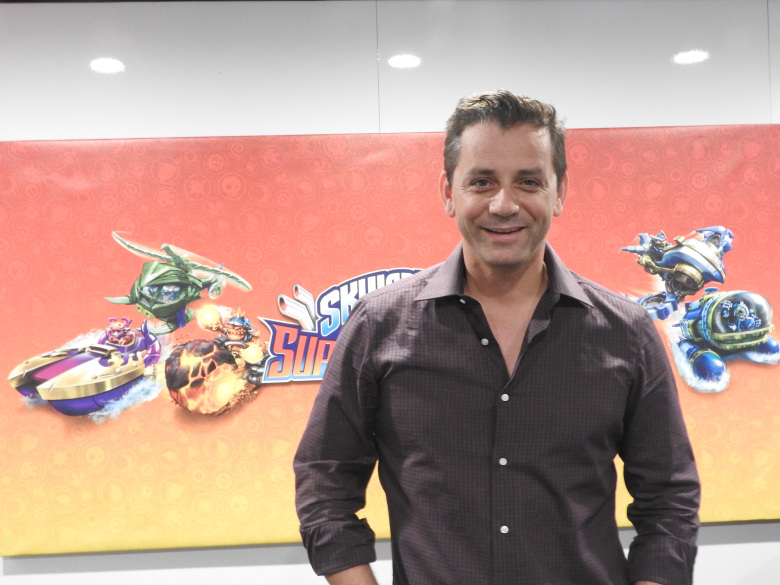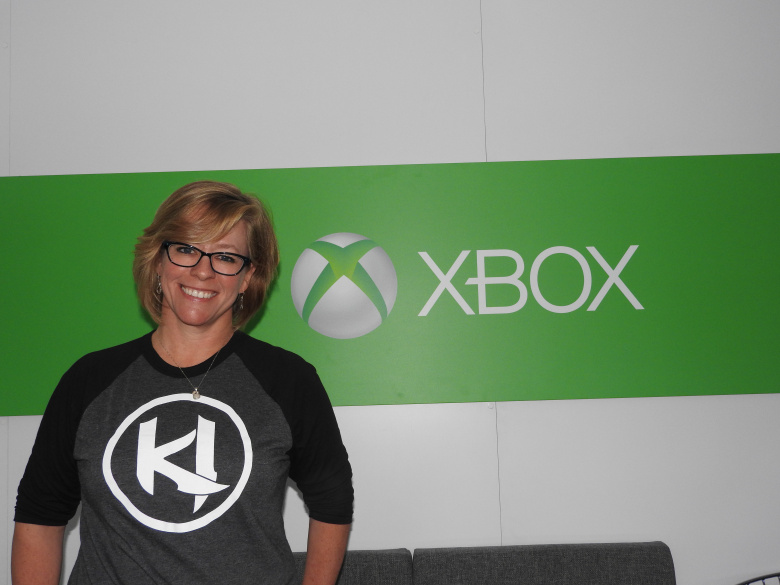Listening is one of the things I like best about my job. Over the past few weeks, at the Electronic Entertainment Expo (E3) in Los Angeles and elsewhere, I had a chance to interview a bunch of executives, CEOs, and game creators about their views on gaming. This week’s column takes snippets of wisdom that I gleaned from those interviews.
I enjoy talking to smart people and interpreting what they have to say. In this case, I’m trying to narrow down to the most important nugget that they each shared during the course of a longer conversation. This is an absurdly difficult task, but as I write this column a couple of weeks after E3, I’m trying to absorb what was really important. I think that everybody in the game industry should undertake this kind of exercise now and then, synthesizing the huge data dump we get from the industry’s biggest trade show and summing it up. And if you were as busy as I was, I’m sure you didn’t have time to read many of these interviews during the show. This is a quick way to catch up on what you missed.
If you want to see the full interview and the context for the quote, click on the person’s name. These are interviews that you’ll read only on GamesBeat, and we are happy to present them to you in digestible form. You’ll notice that most of the photos are by me as well. I’m not the greatest photographer. These people are movers and shakers, but I believe at the core that everyone I interview is a person. I like to convey that humanity in some way through a photo, and I snapped most of these myself as I did the interviews. I hope you enjoy these words and images. Some of these folks will be speaking at our GamesBeat 2015 event on Oct. 12-13 in San Francisco. I’ll let you guess which ones for now.
Also, here are quotes from the 18 game industry leaders we interviewed at last year’s E3.
Mike Gallagher, CEO of the Entertainment Software Association
On diversity at E3 and the gaming business:
“You’ll see examples of the diversity of the industry on display for the whole world to see. When it comes to diversity on an international base, 40 percent of the exhibitors are international companies. When you look at where these products come from and who they’re for, it’s everyone in the world.
“When it comes to gender issues, I spoke about this with you at your conference. We see the trajectory for the games industry as very bright. In 2009, according to IGDA, nine percent of the industry were women. According to the same source today, that number is 22 percent. The Higher Education Video Game Alliance, 63 universities with programs that teach video games or have video game degree programs, they’ve said that their video game programs have proportionally twice the representation of women compared to computer science and engineering at 34 percent.
“The industry is on a path to an even greater number of women engaged in making games and growing the industry. Women are already playing games, we know that. 44 percent of gamers are women. You’ll see those numbers pull quite a ways ahead of the rest of the tech industry. It’s because we’re a creative medium. You’ll see that on the floor at E3. We’re proud of where the industry is going in that respect.”
Andrew Wilson, CEO of Electronic Arts
On EA’s competition:
“The competition we have is competition for your best time. As human beings, we have an amount of time we allocate every day to entertainment. That might be watching TV. It might be playing games or listening to music or reading books. These days it’s shopping for a lot of people. Amazon wants your shopping experience to be interactive and fun and give you rewards. It sounds a lot like making games to me.
“When we think about competition, we think about you as a player and what you’re engaging with through the day. We know that we need to engage with you a certain amount of time per day in order to maintain that relationship. That might mean we’re competing with another console developer, another mobile developer. It might mean we’re competing with your bank, which is trying to make the banking experience interactive and fun. We might be competing with you and your articles.
“It’s not just competition for games. The world has woken up and recognized that interactive entertainment is the best form of entertainment. All of a sudden everyone is trying to do what we do. We get up and we’re looking left, right, front, back and trying to make sure the experiences we deliver to our players are the most entertaining, most rewarding, most inspiring experiences possible.”
Eric Hirshberg, CEO of Activision Publishing
On a commencement speech he delivered at UCLA about creative leadership:
“That was a speech delivered to kids who just earned an art degree. It was geared toward them, not toward business leaders. But my message to them was to not accept limitations on themselves that the world would try to put on them as creative people.
“When I was asked to share whatever wisdom I’ve learned, it occurred to me that — it made me wonder why so few creative people are asked to lead things. Every other discipline in the business world is routinely considered for leadership positions — operations, finance, law. It’s almost never a creative person. Part of that is perhaps a bias the world has about creative people. Part of it is things creative people tend to do to themselves.
“I encouraged the kids to think of themselves not only as creators, not only as the fuel for organizations, but as potential leaders in those organizations, and to do the work they need to do to be prepared and informed to help make the big decisions. Step out from behind the walls that we put up around ourselves.”
Shannon Loftis, head of publishing for Microsoft Studios
“On Xbox One backward compatibility with Xbox 360 games:
“Gamers have been asking for it since we launched. Recognizing that it’s important to our fanbase, that people have made significant investments in time and passion and money in their 360 collections, we wanted to make sure that value extended into the Xbox One. But it wasn’t easy. It wasn’t simple. We’ve had engineers working on this for a long time. Many of the 360 games are so deep and rich, so beloved, that people aren’t ready to give them up yet. It’s easy to just not make it a choice between the two. You probably already know this — we had scarce engineering resources. But because it was it so much in demand, and because people were enjoying games online so much, we put some people on it. They’ve created 360 emulation in software within the Xbox One architecture. When you put your disc in the drive, we download a little shim that allows it to talk to the 360 emulation. We load up a bit of the Dashboard, and then you launch your game from there. But you still have access to all the Xbox One features.
“Loftis on women heroes in games:
“Gamers form the deepest bonds with the content and have the most immersive and engaged experiences when they have something they can relate to on the screen. Adding a more diverse array of characters invites a more diverse set of gamers. Making gaming more inclusive is good for everybody – good for gamers, good for developers, good for people in general. That’s right. Lara Croft is someone I’ve identified strongly with for years now. Player choice is another thing. The more we give people the opportunity to customize their experiences to suit their tastes, that’s great.”
Brendan Iribe, CEO of Facebook’s Oculus VR
On the company’s new Oculus Touch hand controllers:
“These are the Half Moon prototype of the Touch controllers. The goal with Touch was to make it an extension of yourself, to get your hands in the game. We experimented with a lot of prototypes. We didn’t want you holding wands that you might fatigue on, where you’d have to rest your hands. These rest in your hands. You can keep your hand open and still interact. You’ll be able to point or give a thumbs up. Now you have hands. Your hands are really in the game. Not just you holding something, but being able to look down and feel like those are your hands. You can reach out and pick things up, interact with elements in the world, flick things with your finger, give somebody a thumbs up. This is the first generation on a path toward truly getting your hands in the game, true hand presence.”
Sean Murray, cofounder of Hello Games
On making a massive game like No Man’s Sky with a small team:
“I was at Criterion, which got bought by EA. As Criterion, we were fiercely independent. We had publishers like Acclaim and EA, but they were never allowed in the building, basically. Criterion just worked on its own games. Most people were totally shielded from it.
“After we were bought, it did become more difficult to do something more innovative. A big publisher really comes into its own when it’s doing a sequel, something like that. Doing a new IP is twice as difficult with a large company worrying about it. You just never know. When we first announced No Man’s Sky, there was no way to know whether it would resonate or not. The more people you have involved, the more second-guessing comes about. Are people going to like the name, the style, the content?
“This is a very hard game to make with a small team, but it would be even harder to make with a large team — Ubisoft putting 400 people on it or something like that.”







